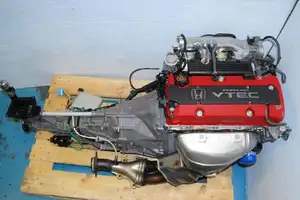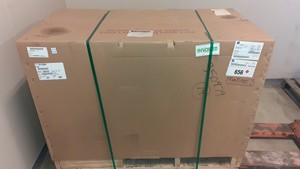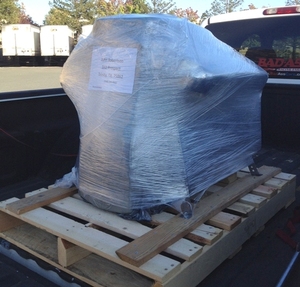
All categories
Featured selections
Trade Assurance
Buyer Central
Help Center
Get the app
Become a supplier

(1065 products available)


















































The Honda f20c is a 2.0 L inline 4-cylinder petrol engine with a DOHC (Dual Overhead Cam) VTEC (Variable Valve Timing Electronic Control) system. The F20C engine is known for its high-revving nature, producing a lot of power and a high specific output. The F20C engine is mainly used in the S2000 sports car. Here are the types of Honda f20c models:
F20C1
The F20C1 is the first and standard variation of the F20C engine. It has a compression ratio of 11.7:1 and a power output of 240 hp at 8,300 rpm and a torque of 153 lb-ft at 7,500 rpm. The engine was mainly used in the US and for the AP1 models.
F20C2
The F20C2 engine is a variation of the Honda f20c engine. The F20C2 has a compression ratio of 10.0:1 and a power output of 125 kW (169 hp) at 6,800 rpm and a torque of 202 N·m (149 lb-ft) at 5,000 rpm. The engine was designed for markets that used the AP2 models.
F20C3
The F20C3 is another variation of the Honda f20c engine. It has a compression ratio of 9.8:1 and a power output of 177 kW (237 hp) at 6,800 rpm and a torque of 220 N·m (162 lb-ft) at 5,500 rpm. The engine was used in the AP2 models.
F20C4
The F20C4 is another variation of the Honda f20c engine. It has a compression ratio of 9.8:1 and a power output of 150 kW (201 hp) at 6,800 rpm and a torque of 220 N·m (162 lb-ft) at 5,500 rpm. The engine was designed for the Honda F20C4 used in the AP2 models.
Regular Oil Changes
Engine oil lubricates moving parts and reduces friction. Check oil levels regularly using the dipstick. Change the oil and filter every 5,000 to 7,500 miles. This keeps the engine clean and protects components.
Air Filter Replacement
The air filter prevents dirt from entering the engine. A clogged filter restricts airflow, reducing efficiency. Inspect the air filter every 15,000 miles or sooner in dusty conditions. Replace it to maintain optimum fuel economy and performance.
Regular Spark Plug Inspection and Replacement
Spark plugs ignite the air-fuel mixture. Worn plugs cause misfires and reduce efficiency. Check spark plugs every 30,000 miles. Look for signs of wear or deposits. Replace them according to the manufacturer’s schedule to ensure smooth engine operation.
Tire Maintenance
Properly inflated tires improve fuel efficiency and safety. Check tire pressure monthly using a gauge. Inflate according to specs in the owner’s manual. Uneven wear indicates alignment issues. Rotate tires every 5,000 to 7,500 miles for even tread wear.
Coolant Flush
The cooling system prevents overheating. Over time, coolant loses effectiveness. Flush the system and replace the coolant every 60,000 miles or as specified. This protects against corrosion and maintains the car’s temperature.
Choosing the right Honda F20C parts and accessories for a vehicle can be a daunting task. Here are some tips that can help make the choice easier:
Car enthusiasts looking to upgrade their vehicles to the Honda F20C engine should understand that the upgrade process is not as easy as it sounds. The Honda F20C engine is a high-performance engine that requires careful handling and expertise to install. While it is possible to install the F20C engine by oneself, it is highly recommended that this engine be installed by a certified mechanic. Below are the basic steps of how the engine can be replaced or installed:
1. Preparation:
Ensure that the workspace is clean and organized. Gather all the necessary tools for the Honda F20C engine swap, including hoists and engine stands. Also, make sure that the car is in a good condition to have the engine replaced.
2. Disconnecting:
Disconnect the battery and all electrical connections to and from the engine. After doing this, the fluids should be drained, and the hoses connected to the engine should be disconnected.
3. Removing the old engine:
After preparing, the old engine should be unbolted from the chassis and lifted out with an engine hoist.
4. Installing the new engine:
The Honda F20C engine should be placed on the engine stand and prepared with all necessary components, including the exhaust and intake systems, mounted. Then, the engine should be fitted into the chassis using the appropriate motor mounts and unbolted from the mounts.
5. Connecting:
All electrical connections, cooling systems, and fuel systems should be connected. The exhaust system should be connected to the engine, and the engine should be connected to the transmission system.
6. Final steps:
After the above steps, go through the checklist to ensure that everything has been done. Start up the engine and allow it to run for a few minutes. Then, lower the vehicle and take it for a test run.
Q1: How does the Honda F20C engine compare to other high-performance engines?
A1: The Honda F20C engine is known for its high specific power output and high-revving nature compared to other engines of similar displacements. However, other engines with larger displacements or forced induction may offer more torque and broader powerbands.
Q2: What is the common maintenance schedule for the Honda F20C engine?
A2: Regular maintenance, such as oil changes, air filter replacements, and spark plug changes, is essential to keep the Honda F20C engine running smoothly. Honda recommends following the maintenance schedule in the owner's manual for specific intervals and required services.
Q3: Can the Honda F20C engine be used for performance projects in non-Honda vehicles?
A3: While the Honda F20C engine can be swapped into other makes and models, it requires significant modifications and customizations. A dedicated chassis, drivetrain, and engine management system must be compatible with the F20C engine.
Q4: What makes the Honda F20C engine a popular choice for car enthusiasts?
A4: The Honda F20C engine is a popular choice among car enthusiasts due to its high performance, high-revving nature, and tuning potential. It has a well-balanced design, making it suitable for various performance applications, from daily driving to track racing.
Q5: What are the common problems associated with the Honda F20C engine?
A5: While the Honda F20C engine is generally reliable, some users have reported issues with valve adjustments and premature wear on the piston rings. Regular maintenance and timely repairs are essential to prevent and address these problems.